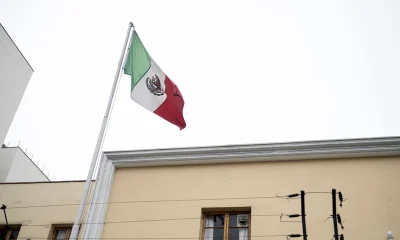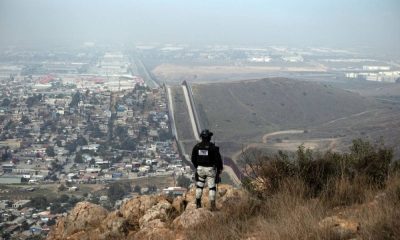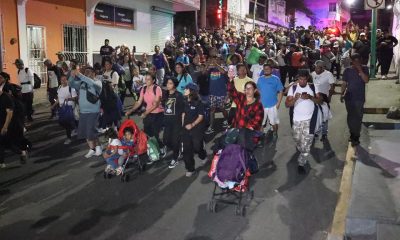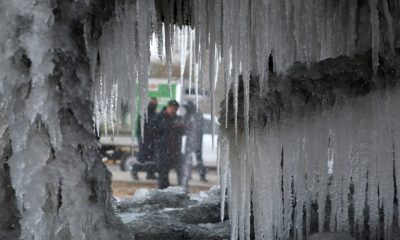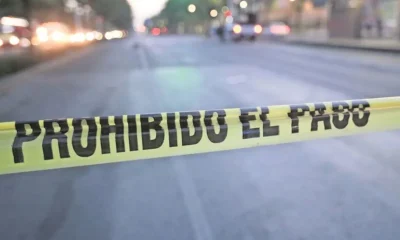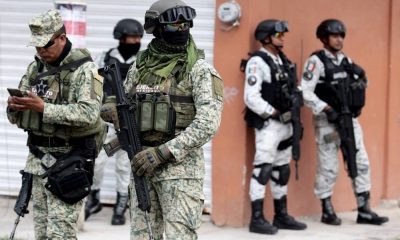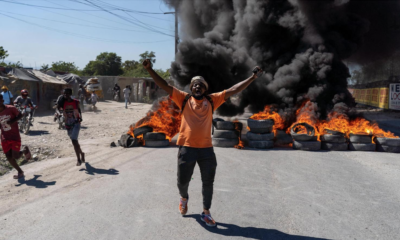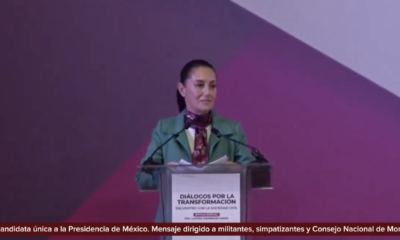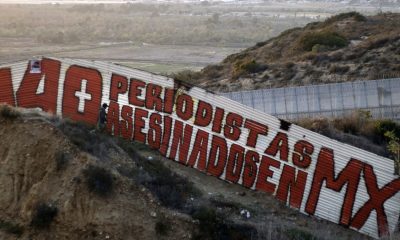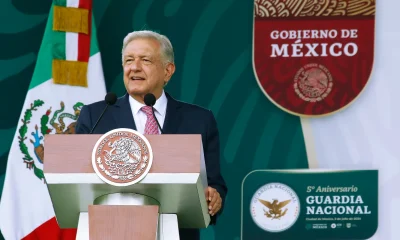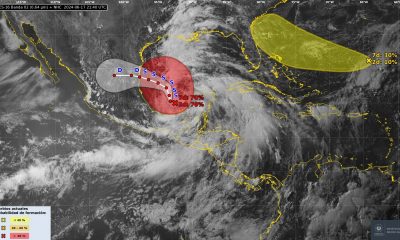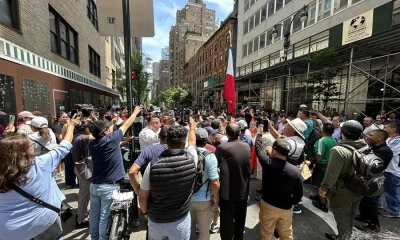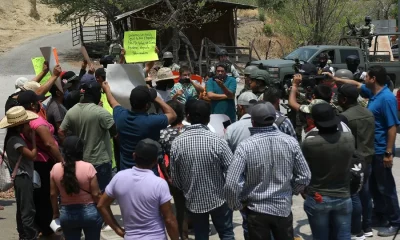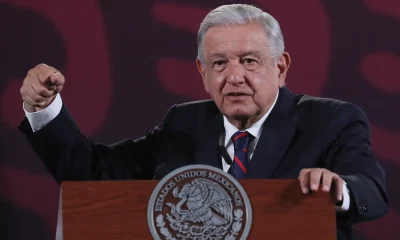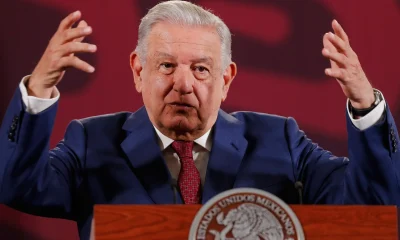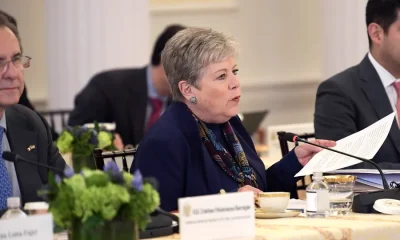Central America
More than 215 gang members deported from Guatemala and Mexico in war on gangs

November 20 |
More than 215 gang members from different terrorist structures have been deported from Guatemala and Mexico to El Salvador as part of the frontal combat against gangs between the end of March 2022 and November 7 of this year, according to data from the General Sub-Directorate of Criminal Investigation (SGIC) of the National Civil Police (PNC) of Guatemala and the National Institute of Migration of Mexico (INM).
On several occasions, the Minister of Justice and Public Security, Gustavo Villatoro, has emphasized that the arrests of the gang members trying to flee from justice are thanks to the good investigative and intelligence work of the Salvadoran police in coordination with Guatemalan and Mexican authorities.
The Security Minister reiterated that the war against gangs, conceived by President Nayib Bukele, will end until the last terrorist is captured and that none of them will escape justice, even if they flee to other countries.
On November 9, the SGIC of the Guatemalan police reported that from January 1 to November 7, 2023, 76 gang members were arrested and handed over to the authorities in El Salvador.
The total number of those apprehended were sent to the Guatemalan Migration Institute (IGM) to be handed over to the Salvadoran Police. Guatemalan authorities indicated that among those captured were 38 members of the Mara Salvatrucha (MS) and 38 of the Barrio 18 gang, from whom 13 pistols, a shotgun, 12 magazines, a motorcycle, two rifles, 192 rounds of ammunition of different calibers, 51 cell phones and a vehicle were seized.
The official report states that the terrorists were wanted by the Salvadoran PNC for committing crimes in the country.
In 2022, 94 Salvadorans were apprehended, of whom 75 were handed over to the security forces and 19 are serving sentences in Guatemala. Of the total number of those captured, 46 were from gang 18, 36 were from the MS and 12 were from other criminal groups. During the operations, 19 firearms, 226 rounds of ammunition of different calibers, 32 cell phones, 14 pistols, nine hoppers and two motorcycles were seized.
The deportees belonged to Las Cachorras, Teclas Locos Salvatruchas and Programas San Marcos MS-13.
The head of the Transnational Anti-Gang Center (CAT), Randall García, commented that the personnel under his charge have carried out 63 deportations and eight captures of members of the cliques, and that the work is carried out by human talent specialized in the search, location and arrest of Salvadoran, Honduran and Mexican criminals operating in Guatemalan territory.
He added that they currently maintain continuous communication with the countries that make up the Northern Triangle of Central America, Mexico and Belize.
“Specific plans are being carried out in border areas where police presence has been maintained with operational control devices, investigation and police intelligence units to reduce the incursion of gang members due to the regime applied by the Government of El Salvador,” said Najarro.
Meanwhile, reports from Mexico’s National Migration Institute (INM) show that in 2021 they arrested seven gang members, while in 2022 they closed with 22 arrests; the figure represents an increase of 214% over the previous year.
According to Mexican authorities, this increase is a result of the security policies implemented by President Bukele’s government against the Mara Salvatrucha (MS-13) and Barrio 18 gangs, which for many years generated terror among Salvadorans.
The latest captures were announced by Minister Gustavo Villatoro. Those arrested were Reyes de Jesús Flores Menjívar, alias Vilma, of the 18 Sureños gang, arrested in Quetzaltenango, Guatemala, and José Steven Tablas López, alias Chele, of the MS-13 structure, apprehended in Tijuana, Mexico.
The terrorists will be prosecuted for the crime of illicit groupings and will serve years in prison. “We are no longer the State that served the interests of criminals. Those times are over,” added the official.
Central America
U.S. and Guatemala Sign Trade Deal Granting Zero Tariffs to Most Exports

The United States signed a reciprocal trade agreement with Guatemala on Friday, under which 70.4% of Guatemalan exports will enter the U.S. market tariff-free.
Guatemalan President Bernardo Arévalo highlighted the importance of the agreement, stating that it creates a framework of cooperation, certainty, and new opportunities for producers, workers, and entrepreneurs in the country. His remarks were shared in a video published on his official social media channels.
In 2025, 30.3% of Guatemala’s total exports were destined for the United States, amounting to approximately $4.3 billion. As a result, the agreement is expected to directly benefit key sectors of the Guatemalan economy, including agribusiness, manufacturing, and the textile industry.
“Today we have taken another step toward consolidating a country that, when it moves forward united, generates confidence, attracts investment, and creates real development opportunities for all its people,” Arévalo added.
The agreement with Guatemala follows a similar trade deal signed by the United States with El Salvador on Thursday, which includes the elimination of a 10% tariff on Salvadoran imports.
Central America
Panama Supreme Court Strikes Down Panama Ports Concession as Unconstitutional

Panama’s Supreme Court of Justice has ruled unconstitutional the concession contract granted in 1997 to Panama Ports Company (PPC), a subsidiary of the Chinese conglomerate CK Hutchison, which operates two strategic ports along the interoceanic canal. The decision was announced on Thursday, January 29, 2026, following two lawsuits filed by the Comptroller General’s Office.
The ruling directly affects the management of the ports of Balboa, on the Pacific coast, and Cristóbal, on the Atlantic side, both of which have been operated by the company for nearly three decades. According to Panama’s Comptroller General, Anel Flores, an audit uncovered irregularities in the contract that resulted in more than $1.3 billion failing to enter state coffers.
“It is a predatory contract, abusive to the interests of the country,” Flores stated.
The Supreme Court determined that Law 5 of 1997, its subsequent amendments, and the automatic extension granted in 2021 are unconstitutional. The ruling noted that the contract renewal took place without adequate oversight and amid allegations of corruption, despite the Panamanian state holding only a 10% stake in the company.
Central America
Guatemala President Says Starlink Terminal Found Inside Prison

Guatemalan President Bernardo Arévalo revealed on Tuesday that a Starlink terminal was discovered inside a prison in the country, highlighting corruption and the illegal introduction of advanced communication technology into the penitentiary system.
Arévalo did not specify which prison the device was found in but stressed that Starlink’s ability to connect directly to low-orbit satellites makes it particularly difficult to disrupt, posing a serious security risk.
The disclosure was made during a press conference attended by Interior Minister Marco Antonio Villeda and Defense Minister Henry Sáenz.
On January 6, specialized units of Guatemala’s National Civil Police (PNC), members of the Army and prison security personnel carried out Operation Sentinel at the Renovación 1 Maximum Security Prison for Men, located in Escuintla. According to the Interior Ministry, the operation aimed to reduce criminal activity, prevent illicit acts and stop the trafficking of prohibited items inside the prison.
During the operation, authorities also dismantled businesses operating near several prisons after detecting routers that were allegedly used to redirect internet signals into penitentiary facilities, according to local outlet Emisoras Unidas.
Tensions escalated further over the weekend of January 17 and 18, when inmates affiliated with gangs staged riots in three prisons. During the unrest, they took prison guards and a psychologist hostage, demanding extra-large beds, air conditioning, transfers to other facilities and access to the internet.
-

 Central America4 days ago
Central America4 days agoGuatemala seizes over a ton of cocaine hidden in flour at Pacific port
-

 Central America3 days ago
Central America3 days agoGuatemala Police Arrest Prison Guard Caught in the Act of Extortion
-

 Central America3 days ago
Central America3 days agoHonduras swears in conservative president Asfura after disputed election
-

 International4 days ago
International4 days agoHistoric snowstorm paralyzes Toronto after 60 centimeters of snow
-

 Central America3 days ago
Central America3 days agoBukele leads public trust rankings as UCA survey highlights gains in security
-

 International4 days ago
International4 days agoSpain’s irregular migrant population rises to 840,000, study finds
-

 Central America2 days ago
Central America2 days agoGuatemala President Says Starlink Terminal Found Inside Prison
-

 International2 days ago
International2 days agoFootball Fan Killed in Clashes After Colombian League Match
-

 International3 days ago
International3 days agoWinter Storm Fern Leaves 30 Dead and Over One Million Without Power Across the U.S.
-

 International3 days ago
International3 days agoDoomsday clock moves to 85 seconds before midnight amid rising global risks
-

 Sin categoría3 days ago
Sin categoría3 days agoEight Killed in Series of Armed Attacks in Ecuador’s Manabí Province
-

 International3 days ago
International3 days agoSpain approves plan to regularize up to 500,000 migrants in Historic Shift
-

 International4 days ago
International4 days agoRights group says nearly 6,000 killed in Iran protest crackdown
-

 International1 day ago
International1 day agoU.S. Senate Rejects Budget, Bringing Government Closer to Shutdown Amid DHS Dispute
-

 Sin categoría3 days ago
Sin categoría3 days agoEl Salvador Launches Fourth Year of Ocean Mission to Protect Marine Ecosystems
-

 International2 days ago
International2 days agoRubio Says U.S. Could Participate in Follow-Up Russia-Ukraine Talks
-

 International2 days ago
International2 days agoMissing Spanish Sailor Rescued After 11 Days Adrift in Mediterranean
-

 International4 days ago
International4 days agoVenezuela frees at least 80 political prisoners, NGO says
-

 International4 days ago
International4 days agoEU launches new probe into X over AI-generated fake nude images
-

 Central America2 hours ago
Central America2 hours agoPanama Supreme Court Strikes Down Panama Ports Concession as Unconstitutional
-

 International1 day ago
International1 day agoStorm Kristin Kills Five in Portugal, Leaves Nearly 500,000 Without Power
-

 International1 day ago
International1 day agoTrump Says Putin Agreed to One-Week Halt in Attacks on Ukraine Amid Extreme Cold
-

 International4 days ago
International4 days agoSevere winter storm grips U.S., leaves multiple dead as extreme cold persists
-

 International1 day ago
International1 day agoMan Arrested After Vehicle Crashes Into Jewish Institution in Brooklyn
-

 International4 days ago
International4 days agoFrance debates ban on social media for children under 15
-

 Central America2 hours ago
Central America2 hours agoU.S. and Guatemala Sign Trade Deal Granting Zero Tariffs to Most Exports



























